Health
Cancer trends revealed, including most common types of the disease and biggest risk factors
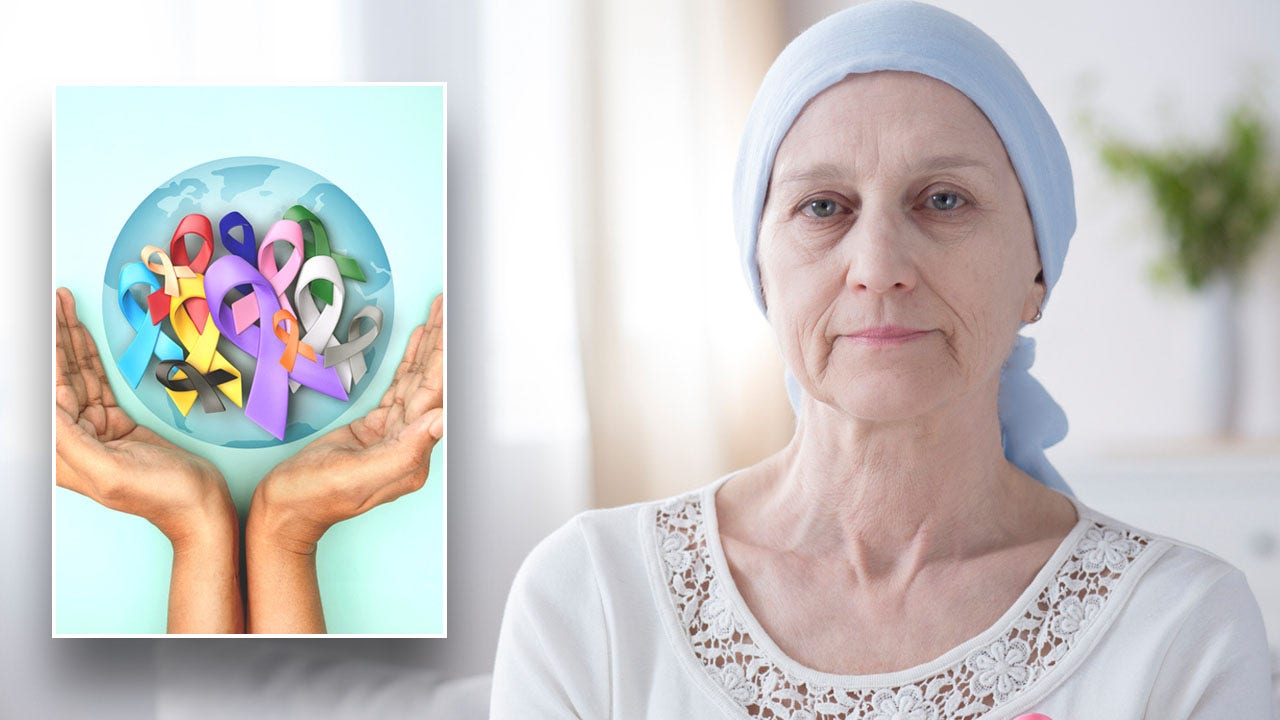
Almost 40% of Americans will receive a cancer diagnosis at some point in their lifetime — but certain types are more common than others, statistics show.
USAFacts, a Washington-based nonprofit that compiles government data and reports on it, took a deep dive into the latest cancer data to identify trends — and shared the results with Fox News Digital.
Of the 1.96 million new cancer cases in 2023, half were made up of five types: breast cancer (15%), prostate cancer (15%), lung and bronchus cancer (12%), colorectal cancers (8%) and all other types (50%).
CANCER CAUSES: THESE 10 HIDDEN CARCINOGENS CAN RAISE THE RISK, ACCORDING TO AN ONCOLOGY EXPERT
Among the 609,820 cancer deaths in 2023, nearly half were made up of lung and bronchus cancer (21%), colorectal cancers (9%), pancreatic cancer (8%) and breast cancer (7%).
The remaining 55% of deaths were attributed to other cancers.
Almost 40% of Americans will receive a cancer diagnosis at some point in their lifetime — but certain types are more common than others. USAFacts, a Washington-based nonprofit that compiles government data and reports on it, studied the numbers and shared trends with Fox News Digital. (iStock)
While cancer cases have risen overall due to a growing population, the share of people getting diagnosed and dying from the disease has decreased.
“Between 2000 and 2019, the incidence rate — or the rate of new cancer cases per 100,000 people — declined by 5.4%, while the annual mortality rate fell by more than 26%,” the report stated.
The share of people getting diagnosed and dying from cancer has actually decreased.
“This suggests improvements in cancer prevention, detection and treatment,” Dr. Brett Osborn, a Florida neurologist and longevity expert, told Fox News Digital in a statement.
Osborn was not involved in the report, but commented on the findings.
Here are five standout observations.
1. Gender-specific risk
As of 2019, men were about 15.4% more likely to receive a new cancer diagnosis and 37.5% more likely to die from the disease than women.
That gap has narrowed since 2000, however, when the cancer incidence rate was more than 37% higher for men.
FOODS TO EAT, AND NOT EAT, TO PREVENT CANCER, ACCORDING TO A DOCTOR AND NUTRITIONIST
For men, the most common cancers are prostate, lung and colorectal cancers, the USAFacts report stated.
Those types made up 50.8% of new cancer cases and 45.9% of cancer deaths in 2023 among males.
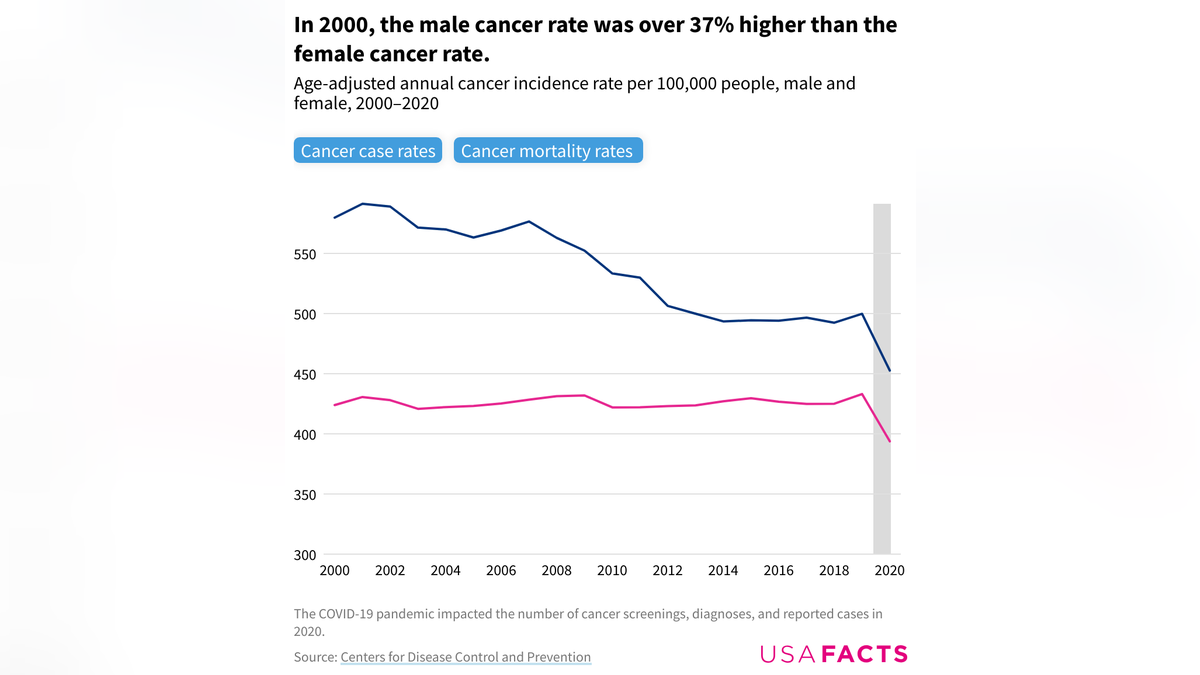
As of 2019, men were about 15.4% more likely to receive a new cancer diagnosis and 37.5% more likely to die from the disease than women. (Centers for Disease Control and Prevention )
Among women, the most prevalent types are breast cancer, lung cancer and colorectal cancer.
Those three types comprised 54.6% of new cancer cases and 50.1% of cancer deaths in 2023 for females.
2. Cancer rates across ethnic groups
White Americans have the highest rate of new cancer diagnoses, followed by non-Hispanic Black Americans, the report stated.
Among cancer deaths, however, non-Hispanic Black Americans are at the highest risk.
SOME BREAST CANCER PATIENTS COULD BE AT RISK OF ANOTHER TYPE OF CANCER, STUDY REVEALS
Non-Hispanic Asian/Pacific Islander Americans have the lowest risk of diagnosis and mortality.
Overall cancer incidence rates have dropped between 2000 and 2019 for every group except American Indian/Alaska Native people, who experienced a nearly 35% increase in diagnoses.
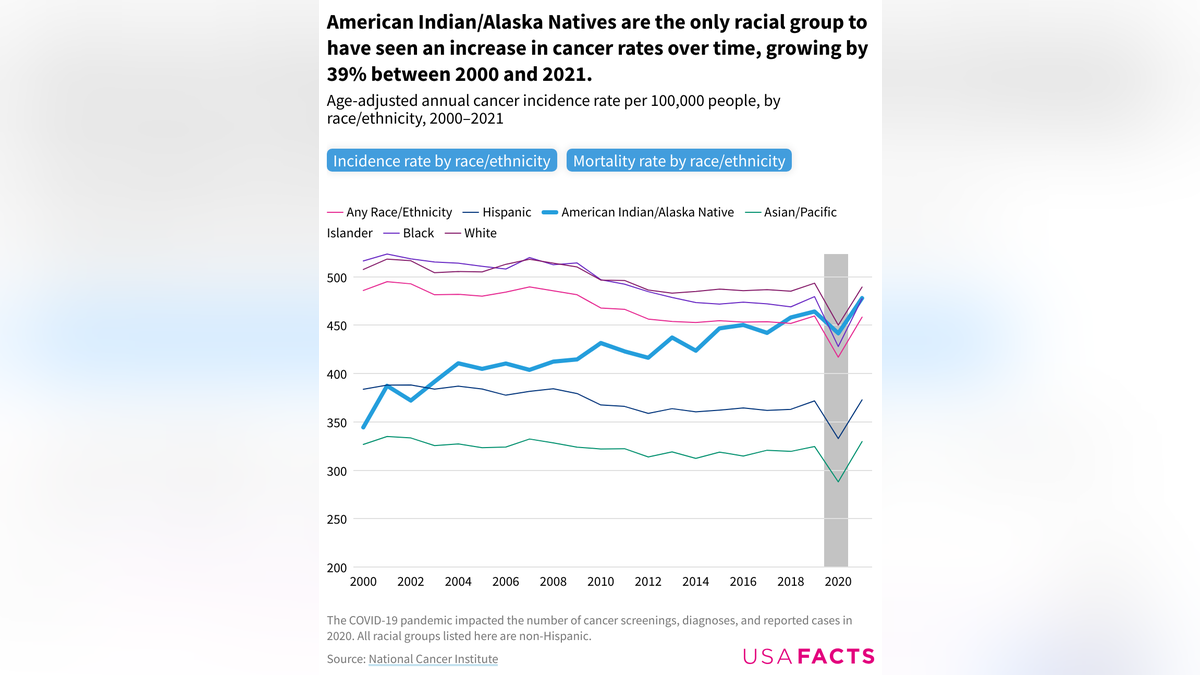
White Americans have the highest rate of new cancer diagnoses, followed by non-Hispanic Black Americans, the report stated. (National Cancer Institute)
“While the reason behind these disparities is hard to pin down, contributing factors include access to health care, environmental conditions, lifestyle behaviors and genetics,” the report states.
3. Cancer survival rates
The five-year cancer survival rate has risen, going from 63.5% in 2000 to 68.4% in 2015 — and is expected to continue its upward trend.
“This improvement is credited to better prevention, early detection and advancements in treatment,” according to Osborn.
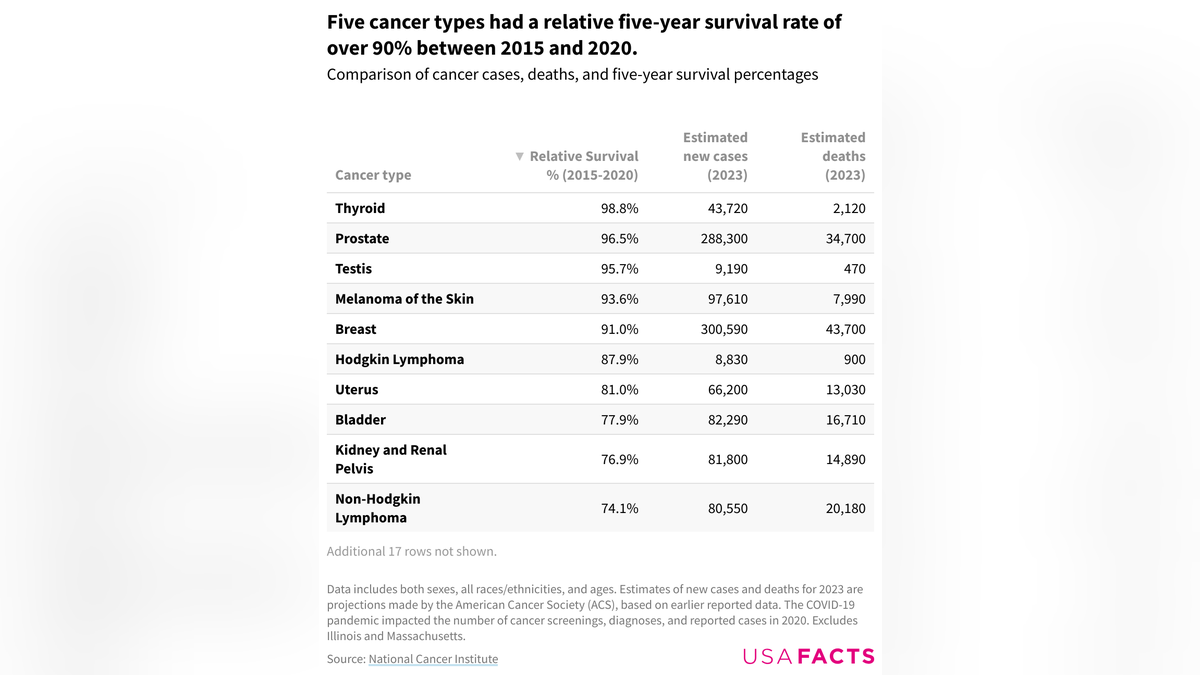
The five-year cancer survival rate has risen, going from 63.5% in 2000 to 68.4% in 2015, and is expected to continue its upward trend. (National Cancer Institute)
Survival rates vary by cancer type.
The cancers with the highest five-year survival rate are thyroid (98.8%), prostate cancer (96.5%), testicular cancer (95.7%), skin cancer (93.6%) and breast cancer (91.0%).
CANCER RATES RISING IN YOUNG PEOPLE DUE TO ‘ACCELERATED AGING,’ NEW STUDY FINDS: ‘HIGHLY TROUBLING’
“It should be noted that estimated cancer deaths in 2023 do not reflect the five-year survival rate between 2015 and 2020, as deaths in 2023 may result from cancer cases diagnosed prior to the five-year window,” the report stated.
4. Average age of cancer diagnosis
Age is the most prevalent risk factor for a cancer diagnosis, according to the report.
Diagnosis rates rise steadily for each decade of life.
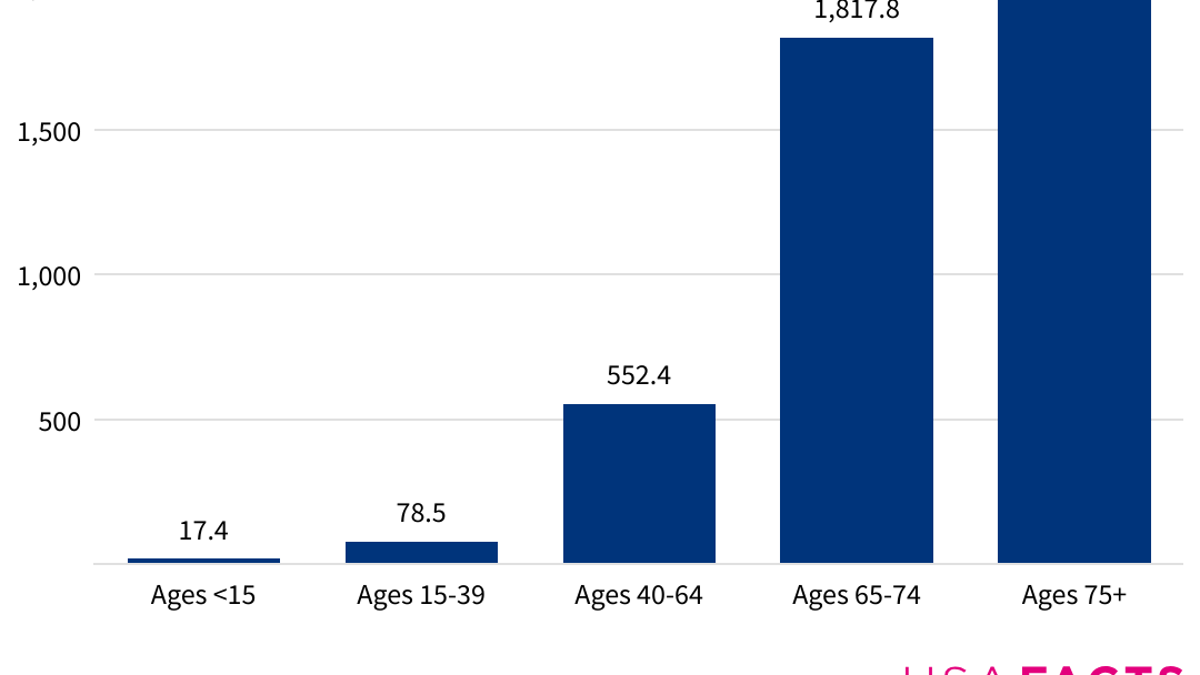
Age is the most prevalent risk factor for a cancer diagnosis, according to the new report. (National Cancer Institute)
The average age of diagnosis is 66 and the average age of death is 72, according to data gathered by the National Cancer Institute (NCI) between 2016 and 2020.
The disease can occur at any age, however — which is why experts recommend early screenings to reduce mortality rates.
5. Importance of guarding against ‘complacency’
Despite the improvements in cancer incidence and mortality rates, Osborn warned that Americans “should not be lulled into complacency.”
CLICK HERE TO SIGN UP FOR OUR HEALTH NEWSLETTER
“According to 2024 data from the American Cancer Society, the incidence of six of the most common cancers – namely those related to excess body weight, such as endometrial, liver, kidney, pancreas, colorectal and breast – are on the rise and may temper the declining mortality rate in the future,” he warned.
Rising obesity rates in the U.S. are a direct cancer driver, Osborn indicated.
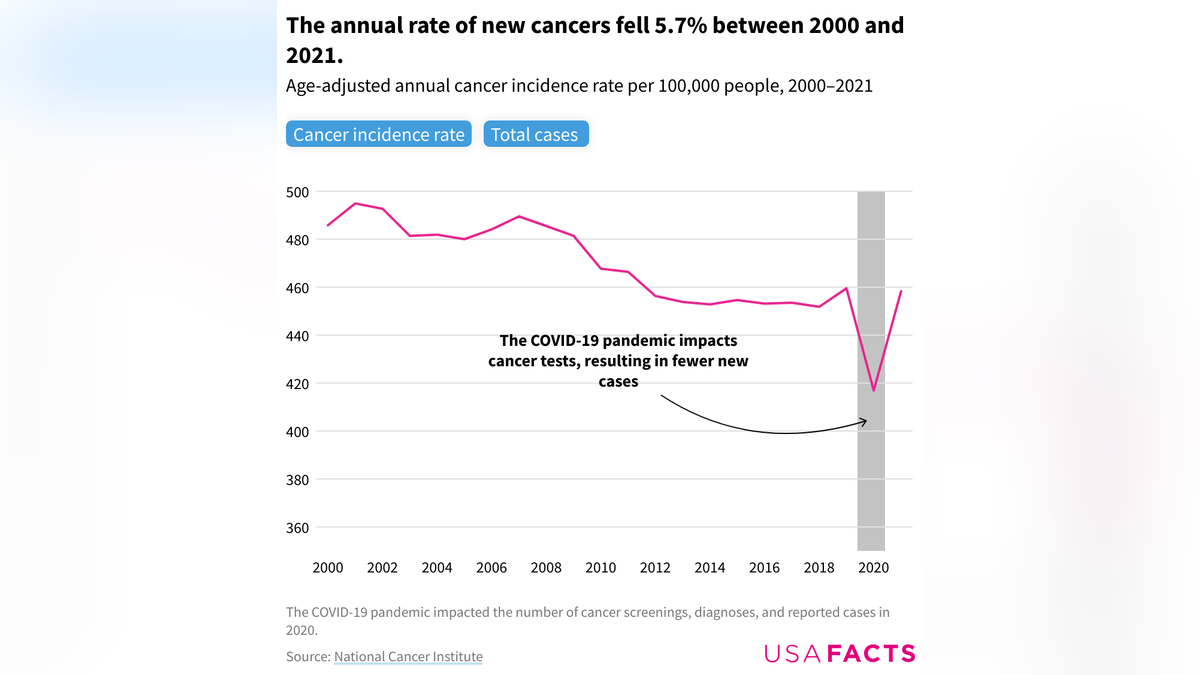
While cancer cases have risen overall due to a growing population, the share of people getting diagnosed and dying from the disease has decreased. (National Cancer Institute)
“It is estimated that more than two in five adults (42.4%) have obesity – a gateway disease to cancer — according to recent data from the National Institute of Diabetes and Digestive and Kidney Diseases,” said Osborn.
“One can only hope that we are not headed in the wrong direction.”
“Unless the tide is turned and the obesity epidemic is addressed, the observed reduction in the annual rate of new cancers and associated mortality will slow and potentially be extinguished,” he continued.
“One can only hope that we are not headed in the wrong direction.”
USAFacts compiled its report using data from the NCI, the U.S. Centers for Disease Control and Prevention (CDC) and the National Center for Health Statistics (NCHS).
For more Health articles, visit www.foxnews.com/health.

Health
The Keto Diet Explained: Is the Popular Weight Loss Regimen Effective? | Woman's World

Sign Up
Create a free account to access exclusive content, play games, solve puzzles, test your pop-culture knowledge and receive special offers.
Already have an account? Login
Forgot your password?
Get back to the Sign In
Use left and right arrow keys to navigate between menu items.
Use escape to exit the menu.
Health
Pastor based in Dallas shares depression journey, urges others to seek help: ‘Don’t hesitate’
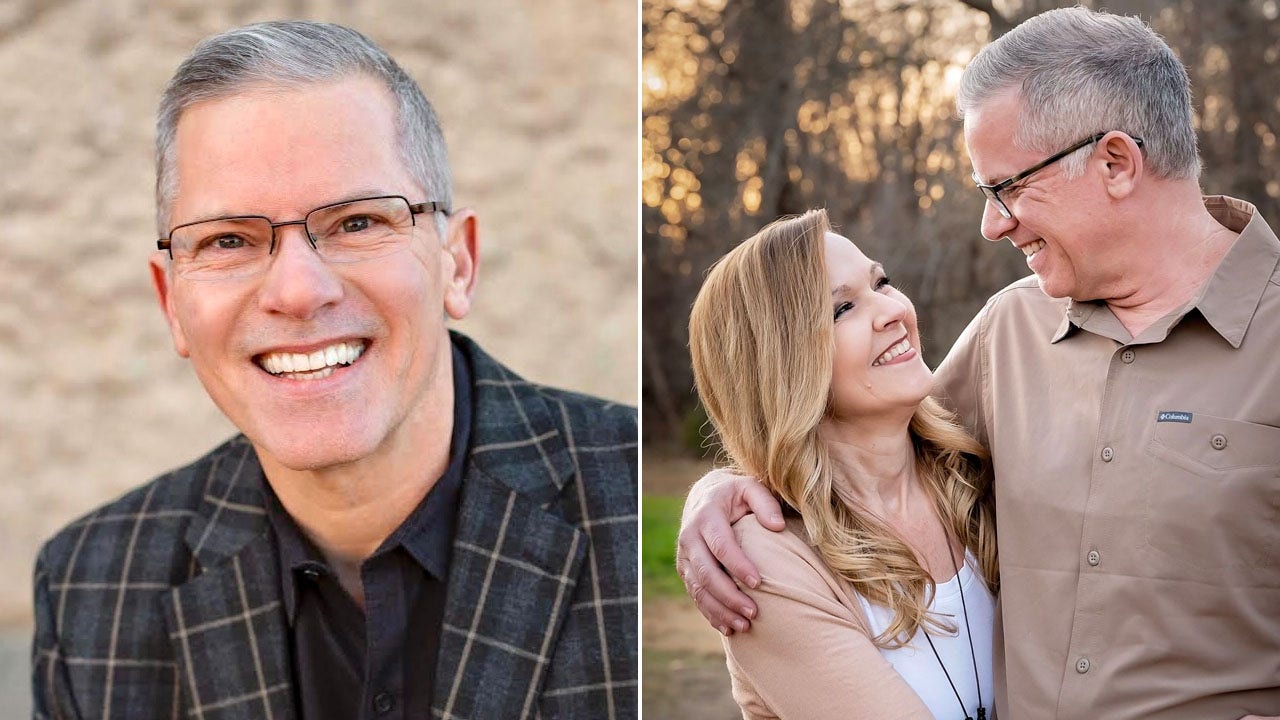
Pastors and other clergy members often serve as pillars of support in times of crisis. Yet what happens when they’re the ones who need to be lifted up?
Mark Dance, a former pastor who lives in Dallas, knows firsthand that mental health struggles can impact those in church leadership.
During his three decades of leading various churches, Dance, now 59, experienced a three-year bout of clinical depression — and now, as a pastor advocate for GuideStone, he helps support other pastors who are struggling.
ILLINOIS PASTOR AND AUTHOR URGES OTHERS AMID TODAY’S EVIL, ‘MAKE AMERICA LOVE AGAIN’
He revealed the details of his story to Fox News Digital.
The ‘three-year fog’
Dance’s mental health challenge began about 15 years ago, when he was in his third pastoral position, he said.
Mark Dance, pictured with his wife, Janet Dance, said he suffered through a three-year period of depression while serving as a pastor. (Dr. Mark Dance)
He and his wife, Janet Dance, were busy navigating life in ministry while raising teenagers — and they were also in the middle of a major move from one church campus to another.
“I noticed that I had become different,” he told Fox News Digital. “I was avoiding people, where I used to love being with people. And it became difficult to sleep, eat and make decisions.”
“I was working way too much, and using ‘the God card’ as an excuse.”
Dance also noticed that he’d lost a significant amount of weight. It was a period that he now refers to as a “three-year fog.”
“I was working way too much, and using ‘the God card’ as an excuse,” he said.
FLORIDA MOM-TO-BE GETS SURPRISE OF HER LIFE FROM HER OWN MOTHER: ‘WISH FULFILLED’
“I was a ‘churchaholic’ who refused to receive the gift of a day off and did not honor the Sabbath. I was neglecting myself, and it just all caught up with me.”
Dance had been down before, he said, but usually he was able to shake it off within a week or two. “But this time, I was stuck for a long time,” he said.
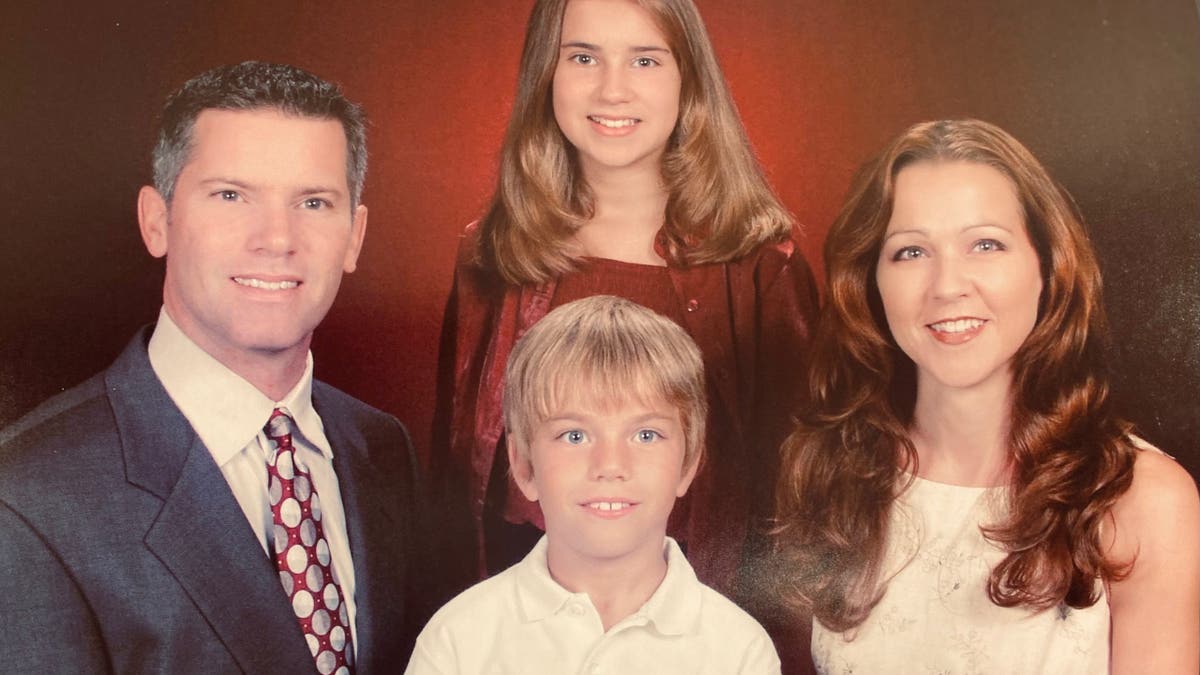
Mark Dance is pictured with his family in 2002. He and his wife, Janet Dance, were busy navigating a life in the ministry while raising their teenagers when his depression journey began, he said. (Dr. Mark Dance)
Although it was “out of character” for him to ask for help, Dance reached out to his family physician — who diagnosed him with clinical depression, prescribed medication and told him to “throttle down.”
By slowing down and focusing on his own needs, Dance was eventually able to “get healthy again.”
A few years later, he transitioned into a new role of helping other pastors overcome their own mental health struggles.
Those in church leadership are just as vulnerable to mental health struggles as the people they serve, Dance said.
“My clinical depression was equivalent to a common cold compared to some other types,” he told Fox News Digital.
AMERICAN VETERANS WHO COMMIT SUICIDE ARE 95% MALE, CRISIS OFTEN DRIVEN BY FAMILY DISPUTES, SAY EXPERTS
“Depression is kind of like cancer in that regard — there are different levels. In my case, it was diagnosed early and was treatable.”
Learning to practice self-compassion
While it might seem that those in church leadership are perpetually strong, they are just as vulnerable to mental health struggles as the people they serve, Dance said.
“We deal with the same issues — health problems, marriage challenges, problems with kids or money,” he said. “But it is more difficult for us to ask for help because it’s counterintuitive for us as caregivers.”
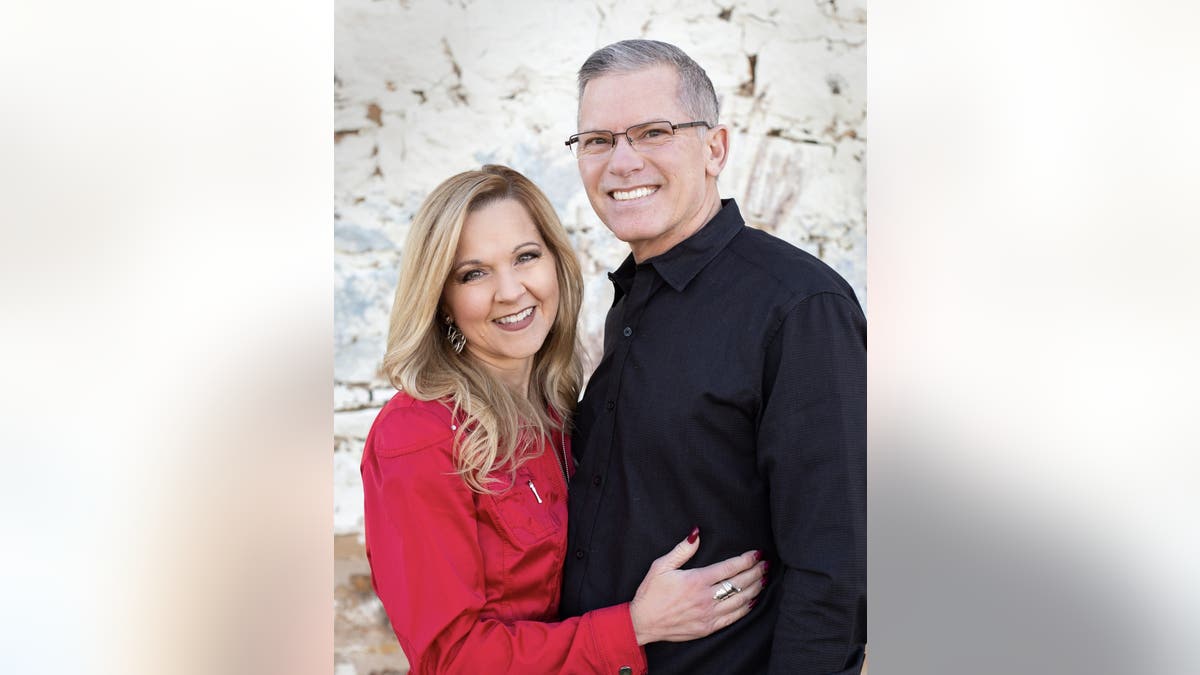
“My wife is my biggest fan and advocate,” Dance said. “Janet stepped up and became the leader of our home and our marriage for about three years, when I couldn’t lead anything.” (Dr. Mark Dance)
A pastor feels compelled to succeed both at work and at home, Dance noted — “because our spouse and kids are in our job description in the Bible.”
That can lead to unrealistic expectations and added pressure, he said.
“About one out of four pastors will experience a mental health challenge,” he told Fox News Digital. “And I just happened to be one of those.”
ILLINOIS PASTOR AND AUTHOR URGES OTHERS AMID TODAY’S EVIL, ‘MAKE AMERICA LOVE AGAIN’
Dr. Norman Blumenthal, director of the Ohel Zachter Family National Trauma Center in New York, noted that members of the clergy are often “benevolent and idealistic individuals” who extend themselves to others, even at the expense of their own well-being.
“It’s essential to remember that charity and care entail giving generously, but not excessively,” Blumenthal, who is not associated with GuideStone, told Fox News Digital.
“We can give a piece of ourselves, but not ourselves in entirety. When setting limits and triaging those we help, clergy often provide more effectively and abundantly than less.”
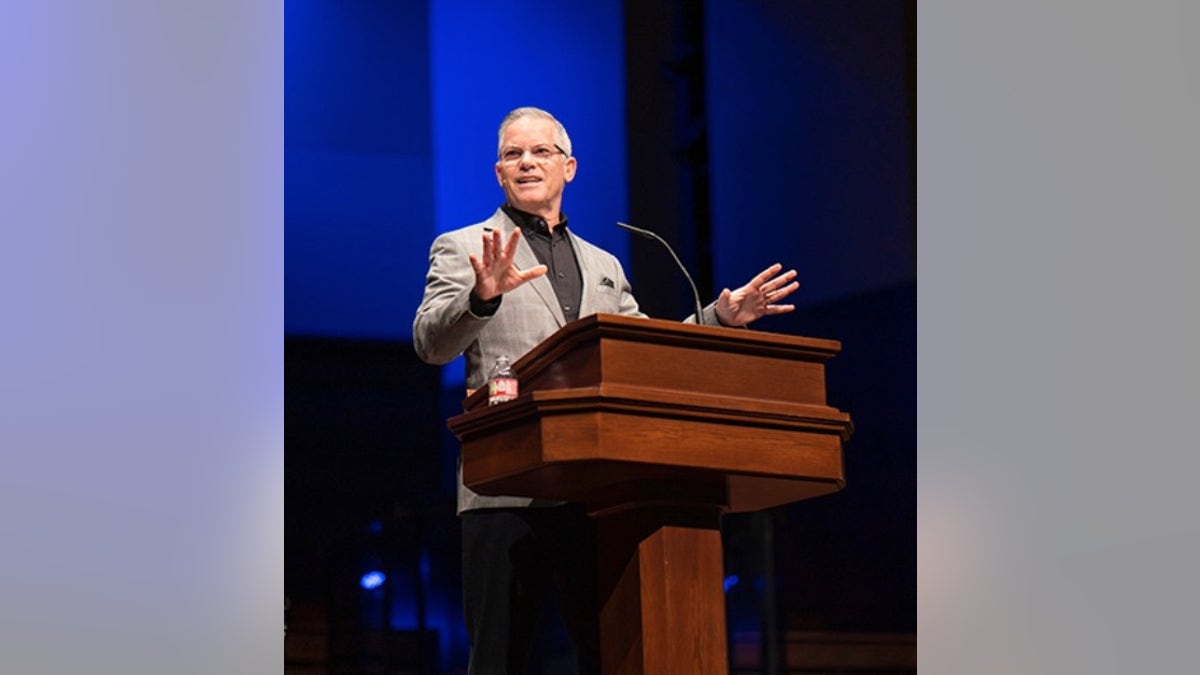
While it might seem that those in church leadership are perpetually strong, they are just as vulnerable to mental health struggles as the people they serve, Dance pointed out. (Dr. Mark Dance)
While pastoring requires compassion for others, exercising self-compassion is just as important, according to Yale University’s Dr. Emma Seppälä, author of “Sovereign: Reclaim your Freedom, Energy and Power in a Time of Distraction, Uncertainty, and Chaos.”
“Often, people in service-oriented professions give a lot to others without taking into account that they need to give to themselves as well,” Connecticut-based Seppälä, who is also not associated with GuideStone, told Fox News Digital.
“As I tell pastors, the only thing between you and help is your pride.”
“You can’t easily give from an empty cup. Self-compassion is the ability to treat oneself as one would treat a loved one — with kindness, consideration, respect and nurturing.”
This might include the ability to set boundaries so that there is enough time in the day to get exercise or proper nutrition, Seppälä added.
“Ideally, pastors should include themselves in their ministry.”
Having the courage to ask for help
Clergy members who experience depression or other mental health conditions need just as much help as the general population, Dance said.
While counseling others dealing with depression, he often hears the common sentiment that depression “sneaks up on you.”
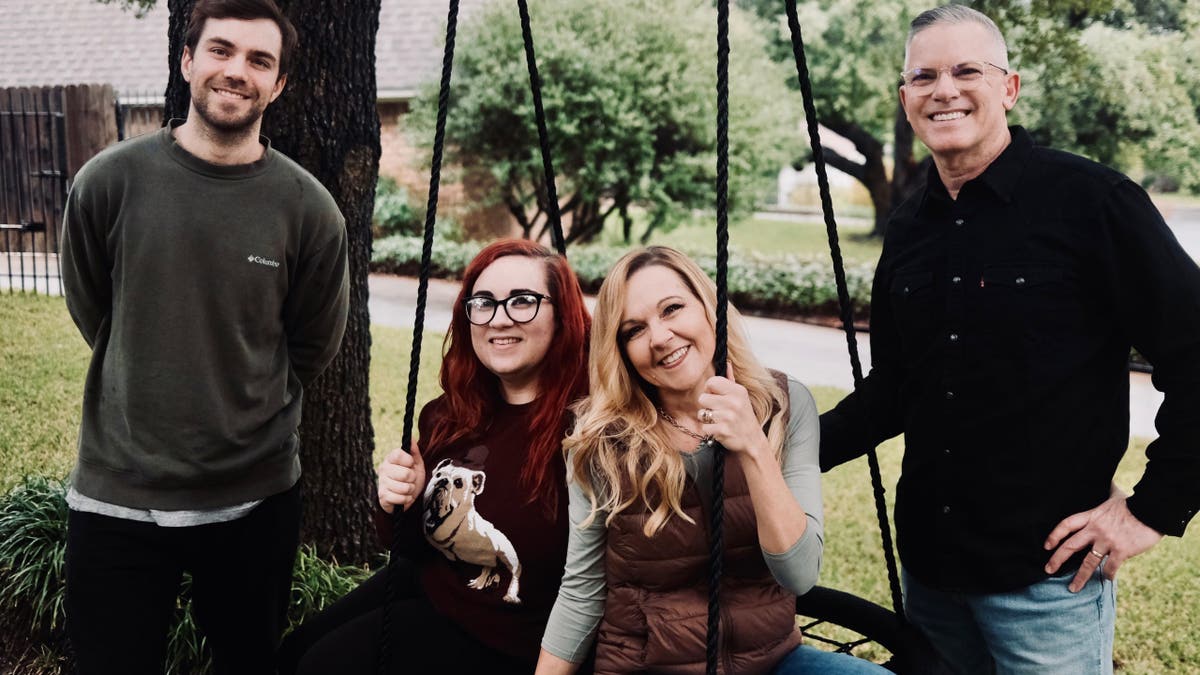
Mark Dance (far right) is pictured in a recent photo with his wife, Janet Dance, and the couple’s children, Brad and Holly. (Dr. Mark Dance)
“It’s usually not a big freight train that runs you over,” he said. “It can start with lack of sleep, or a dramatically increased or decreased appetite. It can be very subtle.”
Reaching out for help takes courage and humility, Dance pointed out.
“As I tell pastors, the only thing between you and help is your pride,” he said.
NURSES CALL FOR CHANGE AS MANY REVEAL THEY’RE ‘EXTREMELY LIKELY’ TO LEAVE PROFESSION: ‘EMOTIONAL, STRESSFUL’
In his role, Dance often tells preachers, “Don’t self-diagnose and don’t hesitate to ask for help.”
“God has not called us to be competent in everybody else’s profession — if you’re a pastor, it’s OK not to be a mental, physical or financial health professional. Just be a pastor and let other people help you.”
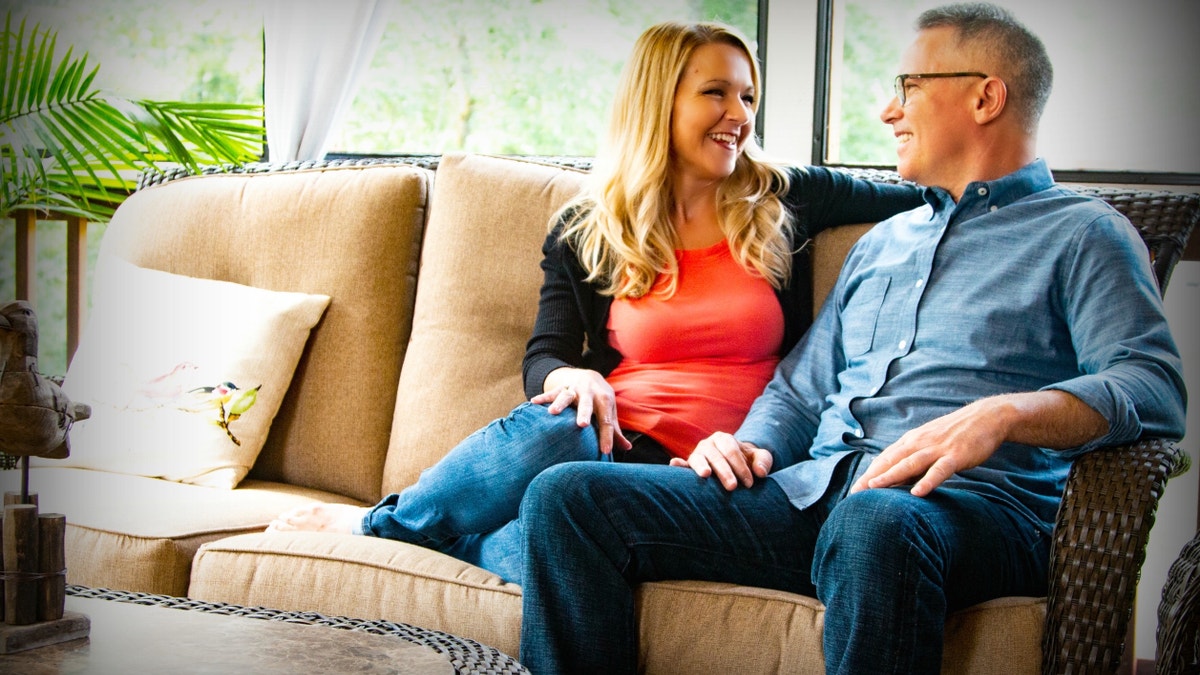
Dance’s wife, Janet, encouraged him to seek help during his struggles. Clergy members who experience depression or other mental health conditions need just as much help as the general population, Dance said. (Dr. Mark Dance)
At GuideStone, Dance said, the focus is on helping pastors and ministers to “stay well and finish well.”
“I help people think about what a strong finish would look like at the end of their ministry, and it’s very fulfilling.”
Supported by faith
During Dance’s depression journey, he relied on his church and his faith to get him through.
“Church is a place where you can grow in all areas — not just one,” he said. “For me, church became a place where I could receive help from my own members.”
“And that’s the experience I’ve had for the last 36 years of industry — if the pastors ask for help, the church members will reciprocate.”
“I learned to become more physically, mentally and spiritually healthy, through the process of my mind being renewed by the Lord and His people.”
The pastor also drew strength from the Bible — particularly his favorite verse, below.
“Do not conform to the pattern of this world, but be transformed by the renewing of your mind. Then you will be able to test and approve what God’s will is — his good, pleasing and perfect will” (Romans 12:2).
CLICK HERE TO SIGN UP FOR OUR HEALTH NEWSLETTER
Listening to God is an important part of self-care, according to Dance.
“He’s the one who designed us — He knows how to help us stay well,” he said. “I learned to become more physically, mentally and spiritually healthy, through the process of my mind being renewed by the Lord and His people.”
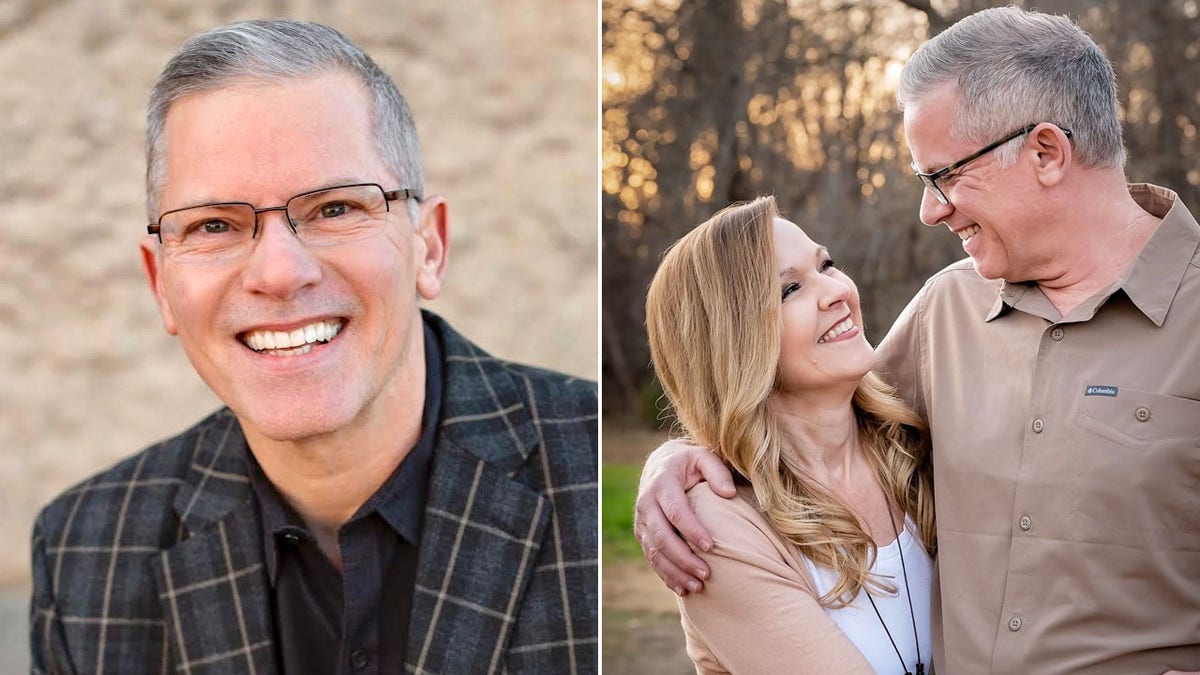
Pastors and others can visit www.GuideStone.org/mentalhealth to see Dance’s video testimony and to get support from a pastoral counselor, Dance told Fox News Digital. (Dr. Mark Dance)
Dance also draws support from his wife of 36 years and their two children.
“My wife is my biggest fan and advocate,” he said. “Janet stepped up and became the leader of our home and our marriage for about three years, when I couldn’t lead anything.”
“She’s a big part of how I got healthy and how I’m staying healthy.”
Pastors and others can visit www.GuideStone.org/mentalhealth to see Dance’s video testimony and to get support from a pastoral counselor.
For more Health articles, visit www.foxnews.com/health.
Health
Alabama pastor shares journey of depression, urges others to seek help: ‘Don’t hesitate’

Pastors and other clergy members often serve as pillars of support in times of crisis. Yet what happens when they’re the ones who need to be lifted up?
Mark Dance, a former pastor who lives in Alabama, knows firsthand that mental health struggles can impact those in church leadership.
During his three decades of leading various churches, Dance, now 59, experienced a three-year bout of clinical depression — and now, as a pastor advocate for GuideStone, he helps support other pastors who are struggling.
ILLINOIS PASTOR AND AUTHOR URGES OTHERS AMID TODAY’S EVIL, ‘MAKE AMERICA LOVE AGAIN’
He revealed the details of his story to Fox News Digital.
The ‘three-year fog’
Dance’s mental health challenge began about 15 years ago, when he was in his third pastoral position, he said.
Mark Dance, pictured with his wife, Janet Dance, said he suffered through a three-year period of depression while serving as a pastor. (Dr. Mark Dance)
He and his wife, Janet Dance, were busy navigating life in ministry while raising teenagers — and they were also in the middle of a major move from one church campus to another.
“I noticed that I had become different,” he told Fox News Digital. “I was avoiding people, where I used to love being with people. And it became difficult to sleep, eat and make decisions.”
“I was working way too much, and using ‘the God card’ as an excuse.”
Dance also noticed that he’d lost a significant amount of weight. It was a period that he now refers to as a “three-year fog.”
“I was working way too much, and using ‘the God card’ as an excuse,” he said.
FLORIDA MOM-TO-BE GETS SURPRISE OF HER LIFE FROM HER OWN MOTHER: ‘WISH FULFILLED’
“I was a ‘churchaholic’ who refused to receive the gift of a day off and did not honor the Sabbath. I was neglecting myself, and it just all caught up with me.”
Dance had been down before, he said, but usually he was able to shake it off within a week or two. “But this time, I was stuck for a long time,” he said.

Mark Dance is pictured with his family in 2002. He and his wife, Janet Dance, were busy navigating a life in the ministry while raising their teenagers when his depression journey began, he said. (Dr. Mark Dance)
Although it was “out of character” for him to ask for help, Dance reached out to his family physician — who diagnosed him with clinical depression, prescribed medication and told him to “throttle down.”
By slowing down and focusing on his own needs, Dance was eventually able to “get healthy again.”
A few years later, he transitioned into a new role of helping other pastors overcome their own mental health struggles.
Those in church leadership are just as vulnerable to mental health struggles as the people they serve, Dance said.
“My clinical depression was equivalent to a common cold compared to some other types,” he told Fox News Digital.
AMERICAN VETERANS WHO COMMIT SUICIDE ARE 95% MALE, CRISIS OFTEN DRIVEN BY FAMILY DISPUTES, SAY EXPERTS
“Depression is kind of like cancer in that regard — there are different levels. In my case, it was diagnosed early and was treatable.”
Learning to practice self-compassion
While it might seem that those in church leadership are perpetually strong, they are just as vulnerable to mental health struggles as the people they serve, Dance said.
“We deal with the same issues — health problems, marriage challenges, problems with kids or money,” he said. “But it is more difficult for us to ask for help because it’s counterintuitive for us as caregivers.”

“My wife is my biggest fan and advocate,” Dance said. “Janet stepped up and became the leader of our home and our marriage for about three years, when I couldn’t lead anything.” (Dr. Mark Dance)
A pastor feels compelled to succeed both at work and at home, Dance noted — “because our spouse and kids are in our job description in the Bible.”
That can lead to unrealistic expectations and added pressure, he said.
“About one out of four pastors will experience a mental health challenge,” he told Fox News Digital. “And I just happened to be one of those.”
ILLINOIS PASTOR AND AUTHOR URGES OTHERS AMID TODAY’S EVIL, ‘MAKE AMERICA LOVE AGAIN’
Dr. Norman Blumenthal, director of the Ohel Zachter Family National Trauma Center in New York, noted that members of the clergy are often “benevolent and idealistic individuals” who extend themselves to others, even at the expense of their own well-being.
“It’s essential to remember that charity and care entail giving generously, but not excessively,” Blumenthal, who is not associated with GuideStone, told Fox News Digital.
“We can give a piece of ourselves, but not ourselves in entirety. When setting limits and triaging those we help, clergy often provide more effectively and abundantly than less.”

While it might seem that those in church leadership are perpetually strong, they are just as vulnerable to mental health struggles as the people they serve, Dance pointed out. (Dr. Mark Dance)
While pastoring requires compassion for others, exercising self-compassion is just as important, according to Yale University’s Dr. Emma Seppälä, author of “Sovereign: Reclaim your Freedom, Energy and Power in a Time of Distraction, Uncertainty, and Chaos.”
“Often, people in service-oriented professions give a lot to others without taking into account that they need to give to themselves as well,” Connecticut-based Seppälä, who is also not associated with GuideStone, told Fox News Digital.
“As I tell pastors, the only thing between you and help is your pride.”
“You can’t easily give from an empty cup. Self-compassion is the ability to treat oneself as one would treat a loved one — with kindness, consideration, respect and nurturing.”
This might include the ability to set boundaries so that there is enough time in the day to get exercise or proper nutrition, Seppälä added.
“Ideally, pastors should include themselves in their ministry.”
Having the courage to ask for help
Clergy members who experience depression or other mental health conditions need just as much help as the general population, Dance said.
While counseling others dealing with depression, he often hears the common sentiment that depression “sneaks up on you.”

Mark Dance (far right) is pictured in a recent photo with his wife, Janet Dance, and the couple’s children, Brad and Holly. (Dr. Mark Dance)
“It’s usually not a big freight train that runs you over,” he said. “It can start with lack of sleep, or a dramatically increased or decreased appetite. It can be very subtle.”
Reaching out for help takes courage and humility, Dance pointed out.
“As I tell pastors, the only thing between you and help is your pride,” he said.
NURSES CALL FOR CHANGE AS MANY REVEAL THEY’RE ‘EXTREMELY LIKELY’ TO LEAVE PROFESSION: ‘EMOTIONAL, STRESSFUL’
In his role, Dance often tells preachers, “Don’t self-diagnose and don’t hesitate to ask for help.”
“God has not called us to be competent in everybody else’s profession — if you’re a pastor, it’s OK not to be a mental, physical or financial health professional. Just be a pastor and let other people help you.”

Dance’s wife, Janet, encouraged him to seek help during his struggles. Clergy members who experience depression or other mental health conditions need just as much help as the general population, Dance said. (Dr. Mark Dance)
At GuideStone, Dance said, the focus is on helping pastors and ministers to “stay well and finish well.”
“I help people think about what a strong finish would look like at the end of their ministry, and it’s very fulfilling.”
Supported by faith
During Dance’s depression journey, he relied on his church and his faith to get him through.
“Church is a place where you can grow in all areas — not just one,” he said. “For me, church became a place where I could receive help from my own members.”
“And that’s the experience I’ve had for the last 36 years of industry — if the pastors ask for help, the church members will reciprocate.”
“I learned to become more physically, mentally and spiritually healthy, through the process of my mind being renewed by the Lord and His people.”
The pastor also drew strength from the Bible — particularly his favorite verse, below.
“Do not conform to the pattern of this world, but be transformed by the renewing of your mind. Then you will be able to test and approve what God’s will is — his good, pleasing and perfect will” (Romans 12:2).
CLICK HERE TO SIGN UP FOR OUR HEALTH NEWSLETTER
Listening to God is an important part of self-care, according to Dance.
“He’s the one who designed us — He knows how to help us stay well,” he said. “I learned to become more physically, mentally and spiritually healthy, through the process of my mind being renewed by the Lord and His people.”

Pastors and others can visit www.GuideStone.org/mentalhealth to see Dance’s video testimony and to get support from a pastoral counselor, Dance told Fox News Digital. (Dr. Mark Dance)
Dance also draws support from his wife of 36 years and their two children.
“My wife is my biggest fan and advocate,” he said. “Janet stepped up and became the leader of our home and our marriage for about three years, when I couldn’t lead anything.”
“She’s a big part of how I got healthy and how I’m staying healthy.”
Pastors and others can visit www.GuideStone.org/mentalhealth to see Dance’s video testimony and to get support from a pastoral counselor.
For more Health articles, visit www.foxnews.com/health.
-

 Politics1 week ago
Politics1 week agoHouse Dems seeking re-election seemingly reverse course, call on Biden to 'bring order to the southern border'
-

 Politics1 week ago
Politics1 week agoFetterman says anti-Israel campus protests ‘working against peace' in Middle East, not putting hostages first
-

 World1 week ago
World1 week agoGerman socialist candidate attacked before EU elections
-

 News1 week ago
News1 week agoUS man diagnosed with brain damage after allegedly being pushed into lake
-

 World1 week ago
World1 week agoGaza ceasefire talks at crucial stage as Hamas delegation leaves Cairo
-

 Politics1 week ago
Politics1 week agoRepublicans believe college campus chaos works in their favor
-

 World1 week ago
World1 week agoStand-in Jose Raul Mulino wins Panama presidential race
-

 World1 week ago
World1 week agoTech compliance reports, Newsletter
/cdn.vox-cdn.com/uploads/chorus_asset/file/24016888/STK093_Google_01.jpg)













